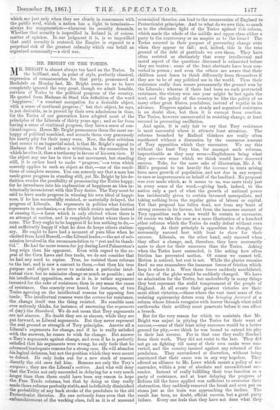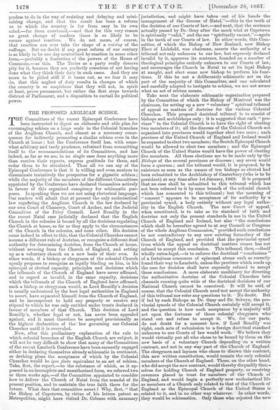MR. BRIGHT ON THE TORIES.
AIR. BRIGHT is almost always too hard on the Tories. In the brilliant, and, in point of style, perfectly classical, expression of commiseration for that party, pronounced at Rochdale on Monday last, Mr. Bright seems to us to have completely ignored the very great, though we admit humble, services of Tories to the political progress of the country. He quoted from Madame de Stael this definition of the word happiness,' a constant occupation for a desirable object, with a sense of continual progress ;" but their object, he says, is not desirable, as is proved by their own admissions in time, for the Tories of our generation have adopted most of the principles of the Liberals of thirty years ago ; and so far from baying a sense of continual progress, they have a sense of con- tinual regress. Hence Mr. Bright pronounces them the most un- happy of political mankind, and accords them very generously his hearty pity for their many woes. Now, the first criticism that occurs to an impartial mind, is that Mr. Bright's appeal to Madame de Steel is rather a witticism, in the connection in which he cites it, than a testimony in favour of his own view. If the object any one has in view is not movement, but standing still, it is rather hard to make "progress,"—a term which scarcely applies to such an object as that,—one of the condi- tions of complete success. You can scarcely say that a man has made great progress in standing still, yet Mr. Bright by his de- finition evades the possibility of pronouncing the Tories happy, for he introduces into his explanation of happiness an idea in- trinsically inconsistent with this Tory desire. The Tory must be said to have made progress in winning his own ideal of happi- ness, if he has successfully resisted, or materially delayed, the progress of Liberals. He represents in politics what friction represents in mechanics,—a force which resists motion instead of causing force which is only elicited where there is an attempt at motion, and is completely latent where there is none. The Tory ought to be happiest if he has nothing to do,— and sufficiently happy if what he does do keeps others station- ary. He ought to have had a moment of pure bliss when he elicited from Lord Russell,—the Liberal leader,—the act of sub- mission involved in the recommendation to "rest and be thank- ful." Ho had far more reason for joy during Lord Palmerston's long reign than his opponent. Even with regard to the re- peal of the Corn Laws and free trade, we do not consider that he had any need to repine. True, he resisted those reforms to the last, and is now a convert to them,—but then his true purpose and object is never to maintain a particular intel- lectual view, but to minimize change as much as possible ; and his intellectual opposition, such as it is, is rather argument invented for the sake of resistance, than in any sense the cause of resistance. One scarcely ever heard, for instance, of two Tories agreeing on the intellectual reasons for opposing free trade. The intellectual reasons were the excuses for resistance, the change itself was the thing resisted. No sensible man ever seriously thinks, for instance, of answering the arguments of (say) the Standard. We do not mean that Tory arguments are not sincere. No doubt they are as sincere, while they are put forward, as Liberal arguments. But they never represent the real ground or strength of Tory principles. Answer all a Liberal's arguments for change, and if he is really satisfied 'with the answers, he ceases to wish for change. But answer a Tory's arguments against change, and even if he is perfectly satisfied that his arguments were wrong, he only feels that be advanced inadequate reasons for a strong case. He will abandon his logical defences, but not the position which they were meant to defend. He only looks out for a new stock of reasons directly the old ones fail him. Reasons are only the Tory's weapens; they are the Liberal's nzotives. And who will deny that the Tories not only succeeded in delaying for a very much longer time than there could have been any reason to hope -the Free Trade reforms, but that by doing so they really made those reforms perfectly stable, and indefinitely diminished the probability of any back stroke of the pendulum to the old Protectionist theories. No one seriously fears even that the enfranchisement of the working class, full as it is of unsound economical theories, can lead to the reconversion of England to Protectionist principles. And to what do we owe this, so much as to the obstinate fight of the Tories against this reform, which made the whole of the middle and upper class either a party to the controversy or an umpire as to the issue? The Tories succeed in their purpose of preventing change even when they appear to fail ; and, indeed, this is the true ground of the debt of gratitude we owe them. They have often resisted so obstinately that every intellectual and moral aspect of the questions discussed is exhausted before they are beaten : some of the least obstinate have been con- verted in person ; and even the others are aware that their children must learn to think differently from themselves if they are to be of any political use in the world. Thus their resistance really does secure permanently the ground won by the Liberals • whereas if there had been no such protracted resistance, the victory won one year might be lost again the next, and the policy of the country be like the policy of so many other great States, pendulous, instead of regular in its advance. Progress against a steady and organized resistance is no doubt slow, but then it is exempt from reaction. The Tories, however unsuccessful in resisting change, at least succeed in preventing oscillation.
And again, it is only fair to say that Tory resistance is most successful where it attracts least attention. The reforms broached by Radical thinkers are really often smothered without a discussion by the enormous amount of Tory opposition which they encounter. We say this without the least Tory bias, for amongst such reforms, impracticable as they may seem—Englishmen being what they are—are some which we think would have deserved success. Take, for the mere sake of illustration, Mr. J. S. Mill's proposal to tax heavily the increase in rents arising from mere growth of population, and not due in any respect to care or improvements on behalf of the landlord. No proposal was ever made which, as it seems to us, was more truly just in every sense of the word,—giving back, indeed, to the nation only a part of what the growth of national power has incidentally given to certain favoured monopolists, and taking nothing from the regular gains of labour or capital. Yet that proposal has fallen dead, not from any 'Want of strong reasons in its favour, but from the immense amount of Tory opposition such a tax would be certain to encounter. Of course we take the case as a mere illustration of a hundred other reforms which the Tories do really defeat without even opposing. As their principle is opposition to change, they necessarily succeed best with least to show for their success. Liberals, on the other hand, only succeed when they effect a change, and, therefore, they have necessarily more to show for their successes than the Tories. Asking when the Tories have succeeded, is like asking how often friction has prevented motion. Of course we cannot tell. Motion is noticed, but rest is not. While the glacier remains fixed no one remembers the immense forces of friction which keep it where it is. Were those forces suddenly annihilated, the face of the globe would be suddenly changed. We have no admiration for the Tories, but undoubtedly in many things they best represent the stolid temperament of the people of England. At all events their greatest victories are their most silent victories,—those where the vast inert mass of the resisting squirearchy deters even the bringing forward of a reform whose friends recognize with horror through what solid earthworks their artillery must penetrate before it can effect a breach.
But for the very reason for which we maintain that Mr. Bright was unjust in pitying the Tories for their want of success,—some of their least noisy successes would be a better ground for pity,—we think he was bound to extend his pity to their last reverse. For in that case they really flinched from their work. They did not resist to the last. They did not go on fighting till many of their own ranks were con- verted, and the country insured against any rebound of the pendulum. They surrendered at discretion, without being convinced that their cause was in any way hopeless. They offered an alliance to Mr. Lowe which meant a policy of no- surrender, within a year of absolute and unconditional sur- render. Instead of really fulfilling their true function as a party of resistance, and at least delaying the progress of Reform till the force applied was sufficient to overcome their obstruction, they suddenly removed the break and even put on steam just as the train was approaching the incline. The result has been, no doubt, official success, but a great party failure. Every one feels that they have not done what they profess to do in the way of resisting and delaying and mini- mizing change, and that the result has been a reform as to which the country is far from easy in its own mind,—far from convinced,—and that for this very reason no great change of modern times is so likely to be secure against reaction. • We do not mean, of course, that reaction can ever take the shape of a raising of the suffrage. But we doubt if any great reform of our century is so likely to be one day neutralized by reaction in some other form,—probably a limitation of the powers of the House of Commons,—as this. The Tories as a party really deserve pity for it, because they are perfectly conscious of not having done what they think their duty in such cases. And they are more to be pitied still if it turns out, as we fear it may do, that this neglect of duty results in changes of which the country is so suspicious that they will not, in spirit at least, prove permanent, but rather the first steps towards distrust of Parliament, and a disposition to curtail its political power.































 Previous page
Previous page